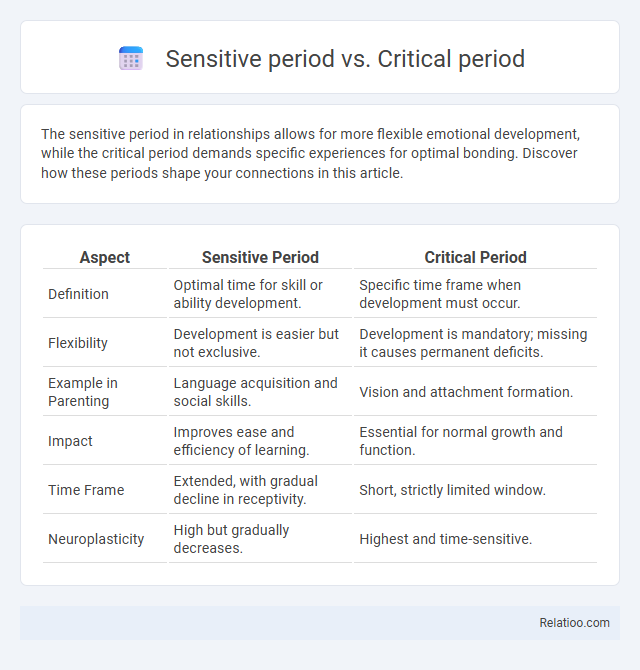The sensitive period in relationships allows for more flexible emotional development, while the critical period demands specific experiences for optimal bonding. Discover how these periods shape your connections in this article.
Table of Comparison
| Aspect | Sensitive Period | Critical Period |
|---|---|---|
| Definition | Optimal time for skill or ability development. | Specific time frame when development must occur. |
| Flexibility | Development is easier but not exclusive. | Development is mandatory; missing it causes permanent deficits. |
| Example in Parenting | Language acquisition and social skills. | Vision and attachment formation. |
| Impact | Improves ease and efficiency of learning. | Essential for normal growth and function. |
| Time Frame | Extended, with gradual decline in receptivity. | Short, strictly limited window. |
| Neuroplasticity | High but gradually decreases. | Highest and time-sensitive. |
Introduction to Sensitive and Critical Periods
Sensitive periods refer to developmental windows when the brain is particularly receptive to specific environmental stimuli, allowing for optimal learning and adaptation. Critical periods are more rigid time frames during which certain experiences must occur for normal development; failure to engage during this time can result in irreversible deficits. Understanding your role in providing the right experiences during these periods is essential for fostering effective cognitive and emotional growth.
Defining Sensitive Periods
Sensitive periods refer to specific developmental windows when Your brain is particularly receptive to certain stimuli, allowing optimal learning and adaptation. Unlike critical periods, which require exposure to stimuli for normal development to occur, sensitive periods offer heightened but not exclusive opportunities for acquiring skills such as language or emotional regulation. Understanding these periods enables targeted interventions that capitalize on Your brain's natural plasticity for effective growth and development.
Understanding Critical Periods
Critical periods represent precise windows in early development when the brain is exceptionally receptive to specific stimuli, making certain experiences crucial for proper neural wiring. Sensitive periods are broader time frames where learning or development is more efficient but not exclusively dependent on that period, allowing Your brain to adapt even outside these intervals. Understanding critical periods clarifies why interventions or learning must occur timely to optimize cognitive, motor, or emotional growth during these vital phases.
Key Differences between Sensitive and Critical Periods
Sensitive periods represent optimal windows for learning specific skills, where development is more efficient but not exclusively limited to that time; critical periods, however, denote strict timeframes during which certain experiences must occur for normal development, or permanent deficits result. The key difference lies in the flexibility of these phases: sensitive periods allow for learning outside the optimal window with reduced efficiency, while critical periods require exact timing for neural and behavioral outcomes. Understanding these distinctions is crucial in fields such as language acquisition, where sensitive periods facilitate language proficiency, but critical periods determine fundamental neural wiring.
Biological Foundations of Sensitive and Critical Periods
Sensitive periods refer to developmental windows when the brain exhibits heightened plasticity, allowing you to acquire certain skills or behaviors more easily, whereas critical periods are strict phases during which specific biological processes must occur for development to proceed normally. The biological foundations of these periods involve synaptic pruning, myelination, and activity-dependent neural circuit refinement driven by genetic and environmental interactions. Understanding these mechanisms highlights the importance of timing in developmental interventions to optimize learning and recovery outcomes.
Examples in Human Development
Sensitive periods in human development refer to optimal windows when the brain is particularly receptive to environmental stimuli, such as language acquisition typically occurring before puberty. Critical periods represent stricter timeframes, like the first few years after birth when visual development must receive proper stimulation to prevent permanent impairment such as amblyopia. Sensitive periods may overlap, highlighting phases like emotional bonding in infancy and adolescence, where experiences shape personality and attachment styles most effectively.
Implications for Learning and Neuroplasticity
Sensitive periods represent windows of heightened neuroplasticity when the brain is particularly receptive to specific types of learning, allowing for gradual adaptation and skill acquisition. Critical periods, in contrast, are narrow, definitive phases during which certain experiences must occur for typical development, as missing these windows can lead to irreversible deficits. Understanding these distinctions informs targeted educational strategies and therapeutic interventions, optimizing learning outcomes by aligning with the brain's temporal plasticity constraints.
Sensitive vs Critical Periods in Language Acquisition
Sensitive periods in language acquisition refer to optimal time frames during which exposure to language greatly enhances learning, while critical periods denote more rigid windows after which language development becomes significantly impaired or impossible. Research shows that children exposed to language during the sensitive period typically achieve native-like fluency, whereas missing the critical period often results in incomplete language mastery and increased difficulty with grammar and pronunciation. Neuroplasticity gradually decreases after the critical period, limiting the brain's ability to acquire language with the same proficiency as during early childhood.
Practical Applications in Education and Parenting
Understanding the distinctions between sensitive periods, critical periods, and sensitive periods is vital for optimizing educational and parenting strategies. Critical periods refer to specific time frames when certain skills or abilities must develop, such as language acquisition in early childhood, while sensitive periods allow for greater flexibility but mark optimal times for learning specific tasks. Your ability to tailor learning experiences during these windows can enhance cognitive, emotional, and social development, ensuring effective skill mastery and emotional growth.
Conclusion: Integrating Sensitive and Critical Periods in Developmental Theory
Integrating sensitive and critical periods in developmental theory highlights that while critical periods involve fixed windows for certain skill acquisitions essential for typical development, sensitive periods offer more flexible timeframes with heightened receptivity to environmental influences. This nuanced understanding allows for tailored interventions that optimize learning and recovery by leveraging the brain's plasticity beyond rigid critical periods. Emphasizing both periods enriches developmental models by acknowledging variability in timing and intensity of neurodevelopmental processes.

Infographic: Sensitive period vs Critical period
 relatioo.com
relatioo.com